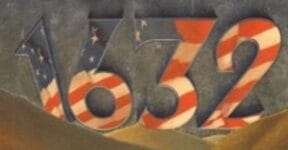Alternate history is a genre categorized under speculative fiction and specifically about stories where some historical series of events were resolved in a certain fashion different from how everything actually happened in real life. Since it’s basically a matter of conjecture built on actual historical facts, the genre revolves around the question of “what if (someone or something interfered with history)?” scenarios.

It typically begins with a retelling of one or more crucial events in human history, followed by imaginary scenarios. For example, your story may start with concise fact-based information about the United States presidential election in the 1960, but then the story strays far from historical records and suggests that JFK was defeated by Nixon.
The genre itself can be divided into two major versions:
- Pure alternate history, where either minor or major changes in historical events trigger consequential effects. The aforementioned fake scenario about the 1960 US presidential election is an example of this version.
- A blend of time-travel and alternate history, in which changes to historical records are only possible because someone or a group of people is transported back to the past. The presence of individuals from the more modern timeline ends up altering the course of events in history. As for the time-travel itself, it might happen because of scientific experiments gone wrong, alien technologies of some sort, cosmic anomalies, etc.
Eric Flint’s 1632 (February 2000) is among the most popular works of the latter type. It involves a present-day small town of Grantville in West Virginia, which has been transported back to 17th century Germany during the Thirty Years’ War.
1632 didn’t really break new ground in alternate history literature. It’s neither the first to use “what if” scenarios to propel its perspective, nor regarded as the first to use time-travel elements in the genre. “Mysterium” by Robert Charles Wilson was published six years earlier in 1994. The novel tells the story of a failed experiment by the United States government, which ends up sending a small American town into a different version of the US run by believers of a religion called Gnosticism. The 1998 novel “Island in the Sea of Time” by Canadian-American author S. M. Stirling follows the tale of the entire inhabitants of Nantucket Island after they’ve traveled back in time to the Bronze Age period and become a world’s superpower.
But there’s no denying that the 1632 series remains one of the most well-known in the genre. Not every volume in the series received critical acclaim, but overall the series has enjoyed massive reception. At least four books had a massive number of sales, earning them a place in the New York Times Best Seller list in the hardcover fiction category.
- 1634: The Galileo Affair stayed on the list for two weeks during April 2004, peaking at number 27.
- 1634: The Baltic War made its way to the list and stayed there for two weeks during May 2007, reaching number 19.
- 1634: The Bavarian Crisis ended up at number 29 on the list for one week in October 2007.
- 1636: The Kremlin Games also took its place on the list for one week at number 30 in June 2012.
Nearly every book in the 1632 series recorded a sales number high enough to get listed on various Locus Bestsellers Lists; some books were also listed multiple times, and a few climbed to the top spot as well. 1635: The Papal Stakes is the first in the series to earn a place in the list of WSJ Best-Selling Books (now defunct).
1637: No Peace Beyond the Line (Eric Flint and Charles E. Gannon) received the 2021 Dragon Award for Best Alternate History Novel. Several other titles received the nomination for the Dragon Awards, including:
| Title | Year | Dragon Award |
| 1635: A Parcel of Rogues | 2016 | Finalist |
| 1636: The Cardinal Virtues | Finalist | |
| 1636: The Ottoman Onslaught | 2017 | Finalist |
| Up-time Pride and Down-time Prejudice | 2020 | Finalist |
| 1637: Dr. Gribbleflotz and the Soul of Stoner | 2022 | Finalist |
| 1638: The Sovereign States | 2024 | Finalist |
Is the series a catalyst for a major change of paradigm in alternate history fiction? We’re hesitant to go that far, although some might say it has become the go-to unofficial manual for every new writer interested in the alternate history genre. Some of the most highly appreciated story elements include:
- Logical consequences: the entire series uses many points of divergence to drive the storyline, both main and secondary plots, but the consequences of each divergence remain logical. While the consequences sometimes lead to a complete mess, any reader shouldn’t have difficulties following the strings of challenges and responses.
- Plot devices: sometimes, a series that includes time-travel doesn’t have to explain the time-travel mechanics and is still enjoyable to read.
- Period-accurate characterizations: it simply is wrong to judge a character from the past by today’s standards. For instance, if you bump into a character who might come across as atrocious, just remember that people were generally atrocious centuries ago. The author had every option to “modernize” the characters and let them make more agreeable choices/decisions (from the present day’s perspectives). However, it wouldn’t be faithful to the time period of the story.
- Real historical figures: at many points in the story, the series uses actual characters from history. That being said, modern people in the historical timeline should not change those characters’ belief system or general worldview.
We think 1632 shines as one of the most popular series in the alternate history genre because of its straightforwardness. It never attempted to be overly innovative with surprising plot twists, distinct writing techniques, or a fresh approach to time paradoxes. Right from the first volume in the series, also titled 1632, the story immediately begins without having to figure out all the complex mechanisms of time travel or the mystery behind the incident. It’s about a group of 21st century Americans put in the middle of a 17th century war, and the story starts from there. While it’s not groundbreaking or revolutionizing the genre in any shape or form, the series has certainly played a crucial role in popularizing the idea of alternate history as a form of speculative fiction.
If you’re writing an alternate history novel, does historical accuracy matter? Is there any alternate history novel written with a hard sci-fi approach? We’d love to hear from you.
Other Things You Might Want to Know
Do I have to read all the books in the series to understand the story?
The 1632 series has dozens of books released since 2000. It’s never a bad idea to get all the subplots and side stories, but you can basically understand the general idea and still enjoy the story from the following seven books only:
- 1632 (2000)
- 1633 (2002)
- 1634: The Baltic War (2007)
- 1635: The Eastern Front (2010)
- 1636: The Saxon Uprising (2011)
- 1636: The Ottoman Onslaught (2017)
- 1637: The Polish Maelstrom (2019)
Does the story conclude in The Polish Maelstrom?
No, it’s still an ongoing story.
Some popular novels about time travel:
- The Time Machine by H. G. Wells
- Thrust by Lidia Yuknavitch
- This Time Tomorrow by Emma Straub
- Slaughterhouse-Five by Kurt Vonnegut
- Recursion by Blake Crouch
- Kindred by Octavia E. Butler
- Rant by Chuck Palahniuk
- The Midnight Library by Matt Haig
- All Our Wrong Todays by Elan Mastai
Check out other articles by month:







